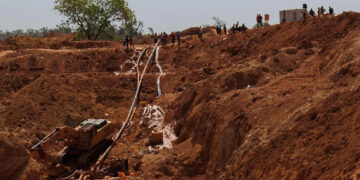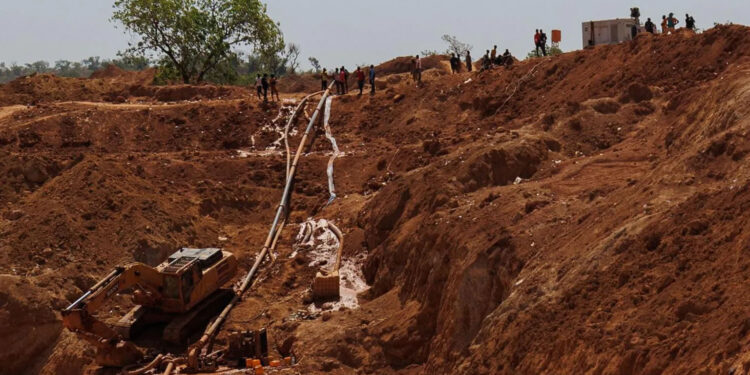More than 40 people, the majority of them women, died on Saturday when an unauthorized gold mine caved in, trapping those inside.
The disaster occurred near Kéniéba, a town in Mali’s western Kayes region, an area known for its rich gold reserves. A representative from a miners’ union told Reuters that the victims had entered abandoned excavation sites left by industrial operators to search for gold remnants.
As they worked, the ground suddenly gave way, burying them. This marks the second major mining accident in Mali within a month. In late January, at least 10 people were killed when water flooded a mining tunnel. The exact number of casualties from Saturday’s collapse remains unclear, with different sources providing varying figures.
A police official quoted by AFP put the death toll at 48, while a mining industry leader told Reuters that 43 people had lost their lives. “Some of the victims fell into the water. Among them was a woman with her baby on her back,” the local police source told AFP.
Local sources informed the BBC that emergency teams had managed to retrieve the bodies of those who perished. Mali is among the world’s top gold producers, but unsafe mining practices make accidents common.
Many mining sites operate without regulation, and artisanal miners often use hazardous methods in their search for gold. More than a year ago, another deadly mine collapse in the country killed at least 40 people.
Due to widespread poverty, many illegal miners—primarily women—scour deserted mining sites, hoping to find gold deposits left behind by larger operators.
A spokesperson from Mali’s Ministry of Mines confirmed the collapse occurred between Kéniéba and Dabia but declined to provide additional details, according to Reuters. Government officials have been dispatched to the scene to investigate, with reports being compiled, Reuters noted.
AFP reported that the mine where the collapse occurred had previously been run by a Chinese company before being abandoned. China has played a major role in developing Mali’s mining sector, with significant state-backed investments in the industry.
Mali possesses vast mineral wealth, including gold, lithium, iron ore, manganese, and uranium, attracting international investors, particularly from China.
While Chinese-backed projects have improved infrastructure, particularly in transportation, they have also resulted in mounting debt, raising concerns about repayment burdens for the Malian government.
Chinese mining operations in Mali have also faced criticism over environmental damage linked to their extraction activities.
Meanwhile, Mali is entangled in a legal battle with Barrick, a Canadian mining giant, over revenue disputes.
Last month, the government seized gold bars worth $245 million (£194 million) from Barrick and issued an arrest warrant for its CEO, Mark Bristow.
Mr. Bristow said he had “no doubt” the conflict would be resolved in an interview with Bloomberg this week.




































